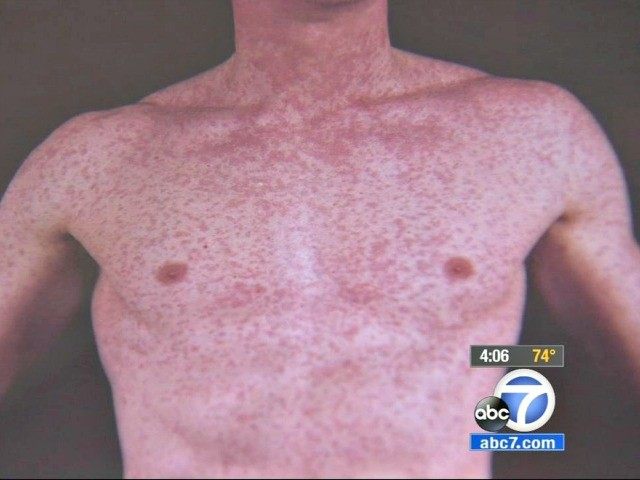An outbreak of measles thought to have originated in Anaheim’s Disneyland amusement park earlier this week has now expanded throughout Southern California, with 45 cases now confirmed in the state and an additional six cases confirmed in three other states and Mexico.
The 51 confirmed cases is nearly double the number reported earlier in the week, according to the Los Angeles Times.
Health officials had initially warned Southern California residents that those who visited the Disneyland or California Adventure theme parks between Dec. 17-20 could be at increased risk for contracting the infection.
Officials told the Times that the measles outbreak has since spread to those who did not visit the theme parks between those dates.
Orange County reportedly confirmed six new cases in people who did not visit the theme parks recently, bringing the total number of infections in the county to 16.
“The identification of six measles cases with acquisition from unknown community contacts indicates exposure to measles is more widespread throughout the county,” Orange County health officials said in a statement. “The Health Care Agency expects that the measles outbreak will continue to spread.”
San Diego County has the second-highest number of infections, with 10 confirmed cases. The county Health and Human Services department said Thursday that of the ten confirmed cases in San Diego County, nine had not received measles vaccinations.
Los Angeles County has the third-highest number of infections, with eight, while Alameda County has four, Ventura County has three, and both Riverside and San Bernardino have two each. In addition to the California infections, two cases have been confirmed in both Utah and Washington and one case has been confirmed in Colorado.
According to the Times, health officials have long feared the consequences of an increasing number of parents refusing to vaccinate their children. Dr. Mark Grabowsky, a health official at the United Nations, wrote about the problem in the Journal of the American Medical Association-Pediatrics last year:
The greatest threat to the U.S. vaccination program may now come from parents’ hesitancy to vaccinate their children. Although this so-called vaccine hesitancy has not become as widespread in the United States as it appears to have become in Europe, it is increasing. Many measles outbreaks can be traced to people refusing to be vaccinated; a recent large measles outbreak was attributable to a church advocating the refusal of measles vaccinations.
Dr. Eric Handler of the Orange County Health Agency issued a letter to parents this week, warning them that their children could be excluded from school activities if they have not received a measles vaccination.
“Measles is an infection that spreads very easily through the air,” Dr. Handler wrote. “Simply being in the same room with someone who has measles is enough to become infected. Because measles is so contagious, it can spread rapidly once introduced and cause outbreaks, especially in schools or day cares where immunization rates are low.”
Symptoms of measles can include fever, eye redness, and runny nose. However, the disease is primarily known for causing a red rash to spread over the body.
“If you have symptoms, and believe you may have been exposed, please contact your healthcare provider,” California Department of Public Health director Dr. Ron Chapman advised in a department bulletin. “The best way to prevent measles and its spread is to get vaccinated.”
According to the Times, the last deadly measles outbreak in California occurred between 1988-1991, when 75 people died as a result of the infection. Most of those who died were babies and children under five years of age.

COMMENTS
Please let us know if you're having issues with commenting.